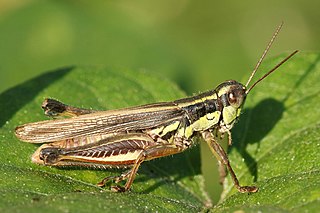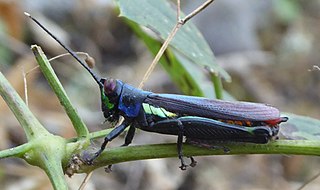
The Melanoplinae are a subfamily of grasshoppers in the family Acrididae. They are distributed across the Holarctic and Neotropical realms. They are one of the two largest subfamilies in the Acrididae. As of 2001 the Melanoplinae contained over 800 species in over 100 genera, with more species being described continuously.

Tettigidea is a genus of groundhoppers or pygmy grasshoppers in the tribe Batrachideini from the Americas. There are at least 40 described species in Tettigidea.

Trimerotropis is a genus of band-winged grasshoppers in the family Acrididae. There are at least 50 described species in Trimerotropis.

The Catostomidae are the suckers of the order Cypriniformes, with about 78 species in this family of freshwater fishes. The Catostomidae are almost exclusively native to North America. The only exceptions are Catostomus catostomus, found in both North America and Russia, and Myxocyprinus asiaticus found only in China. In the Ozarks they are a common food fish and a festival is held each year to celebrate them. The bigmouth buffalo, Ictiobus cyprinellus, can reach an age up to 127 years, making it the oldest known freshwater teleost by more than 50 years.

Dichromorpha viridis, the short-winged green grasshopper, is a common species of slant-faced grasshoppers found in North America.

Orchelimum is a genus of katydid with 21 known species.

The Tanaoceridae are an insect family in the monotypic superfamily Tanaoceroidea in the suborder Caelifera. They are sometimes called desert long-horned grasshoppers.

Arphia is a genus of band-winged grasshoppers in the family Acrididae. There are at least 11 described species in the genus Arphia.

Neotridactylus is a genus of pygmy mole crickets in the family Tridactylidae, recorded from the Americas. There are about 16 described species in Neotridactylus.

Amblytropidia is a genus of slant-faced grasshoppers in the family Acrididae. There are about 14 described species in Amblytropidia.

Taeniopoda is a genus of horse lubbers, fairly large grasshoppers in the family Romaleidae that are native to southwestern United States, Mexico and Central America. There are about 12 described species in Taeniopoda. Taeniopoda is very closely related to Romalea, leading some recent authorities to consider the former a junior synonym the latter.

Brachystola is a genus of grassland lubber grasshoppers in the family Romaleidae, found in the United States and Mexico. They are among the largest grasshoppers found in North America. The species Brachystola magna has meiotic chromosomes that are relatively large and easily visible, and was used in early genetic studies.

Dichroplus is a genus of spur-throated grasshoppers in the family Acrididae. There are more than 20 described species in Dichroplus, found in North, Central, and South America.

Proctolabus is a genus of short-horned grasshoppers in the family Acrididae. There are about eight described species in Proctolabus, found in Mexico and the southwestern United States.

Ronderosia is a genus of spur-throated grasshoppers in the family Acrididae. There are about 10 described species in Ronderosia, found in South America.

Tucayaca is a genus of spur-throat toothpick grasshoppers in the family Acrididae. There are about five described species in Tucayaca, found mainly in South America.

Leptysma is a genus of spur-throat toothpick grasshoppers in the family Acrididae. There are about five described species in Leptysma.

Psiloscirtus is a genus of short-horned grasshoppers in the family Acrididae. There are about seven described species in Psiloscirtus, found in Central and South America.

Cornops is a genus of spur-throat toothpick grasshoppers in the family Acrididae. There are about six described species in Cornops.

The Ommatolampidinae are a subfamily of grasshoppers in the family Acrididae, found in central and South America, and based on the type genus Ommatolampis. Derived from the "Ommatolampides" used by Brunner von Wattenwyl in 1893, the first use of the name in its current form was by Rodríguez et al. in 2013; this taxon appears to be paraphyletic.




















